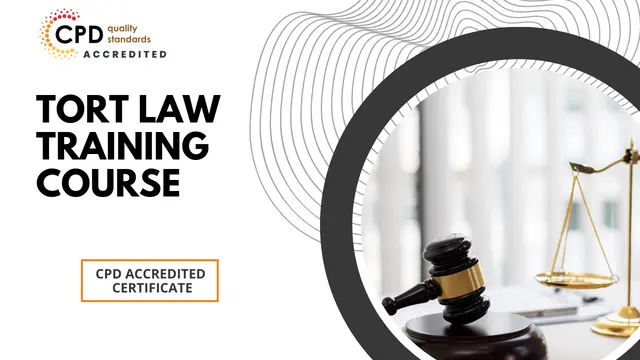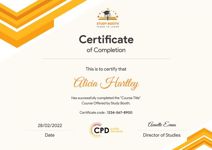
Tort Law Training Course
Advanced Learning Materials | Certificate Accredited by CPD | Lifetime Access | 24/7 Expert Tutor Support
Study Booth
Summary
- Exam(s) / assessment(s) is included in price
- Tutor is available to students
Add to basket or enquire
Overview
Imagine the perplexity of individuals navigating a world of complex legal disputes and liabilities, where every step could either lead to justice or to a mire of litigation. In this intricate realm, the field of Tort Law emerges as a guiding light, illuminating the path through the labyrinth of grievances and wrongdoings. The pain of unintentional harm, the frustration of negligence, and the need to safeguard rights and responsibilities—these underscore the importance of mastering the principles of Tort Law. As society strives for fairness and balance, the knowledge of Tort Law becomes an essential tool for not just legal professionals, but for anyone seeking clarity in the world of rights and responsibilities.
Unlock the secrets of Tort Law with our comprehensive course. From understanding intentional torts and negligence to grasping the concept of strict liability and exploring defences and remedies, our curriculum is a roadmap to navigating this intricate field. Delve into special topics in Tort Law, and learn from caselaw examples that illuminate the application of these principles in real-world scenarios. Enroll now and embark on your journey to understanding the complexities of Tort Law, equipping yourself with a fundamental legal framework that can make a world of difference in your personal and professional life.
Learning Outcome
By the end of this course, you will be able to:
- Analyse and apply the fundamental principles of tort law to real-world scenarios.
- Identify and differentiate intentional torts from other categories of torts.
- Evaluate negligence claims and determine liability in complex situations.
- Discuss and explain the concept of strict liability and its legal implications.
- Explore various defences available in tort cases and their effectiveness.
- Examine and discuss the remedies available to parties in tort disputes.
- Investigate special topics within tort law, including emerging issues.
- Interpret caselaw and draw insights from legal precedents in tort cases.
CPD
Course media
Description
Here is the Curriculum of the Course
- Module 01: Introduction to Tort Law
- Module 02: Intentional Torts
- Module 03: Negligence
- Module 04: Strict Liability
- Module 05: Defences to Torts
- Module 06: Tort Remedies
- Module 07: Special Topics in Tort Law
- Module 08: Caselaw
Here is What You Will Learn from this Course
Module 01: Introduction to Tort Law
You will understand the foundational concepts of tort law, its role in civil litigation, and its impact on individuals and society.
Module 02: Intentional Torts
You will learn about intentional torts, including their elements, types, and legal implications in various scenarios.
Module 03: Negligence
You will grasp the concept of negligence in tort law, understanding its components, causation, and standards of care.
Module 04: Strict Liability
You will learn about strict liability torts, exploring scenarios where liability is imposed without proving fault.
Module 05: Defences to Torts
You will understand the defenses available to defendants in tort cases, such as consent, self-defense, and others.
Module 06: Tort Remedies
You will explore the remedies available to plaintiffs in tort cases, including damages, injunctions, and specific performance.
Module 07: Special Topics in Tort Law
You will delve into special topics within tort law, such as product liability, defamation, and privacy torts.
Module 08: Caselaw
You will learn how to analyse and apply caselaw in tort cases, understanding how legal principles are developed and applied in real-world scenarios.
Who is this course for?
- Law students seeking a thorough grasp of tort law principles.
- Legal professionals aiming to deepen their understanding of tort law.
- Individuals interested in the legal aspects of personal injury and civil wrongs.
- Business professionals wanting to understand liability issues.
- Anyone curious about the legal frameworks surrounding harm and negligence.
Requirements
No formal entry or relevant experience is required for this course!
This training is open to everyone who is willing to learn. All you need is –
- A smart device that has a constant internet connection
- A strong desire to learn the topic
- And being over the age of 16
Career path
Here are a few careers you can opt for:
- Personal Injury Lawyer (£30,000 - £70,000)
- Civil Litigation Solicitor (£30,000 - £60,000)
- Insurance Claims Adjuster (£20,000 - £40,000)
- Legal Consultant (£25,000 - £50,000)
- Compliance Officer (£25,000 - £50,000)
Questions and answers
Currently there are no Q&As for this course. Be the first to ask a question.
Reviews
Currently there are no reviews for this course. Be the first to leave a review.
Legal information
This course is advertised on reed.co.uk by the Course Provider, whose terms and conditions apply. Purchases are made directly from the Course Provider, and as such, content and materials are supplied by the Course Provider directly. Reed is acting as agent and not reseller in relation to this course. Reed's only responsibility is to facilitate your payment for the course. It is your responsibility to review and agree to the Course Provider's terms and conditions and satisfy yourself as to the suitability of the course you intend to purchase. Reed will not have any responsibility for the content of the course and/or associated materials.





